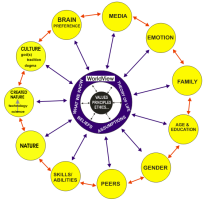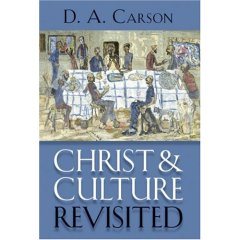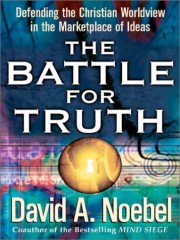17. Maintaining the Mind of Christ
"God looks down from heaven on all mankind to see if there are any who understand, any who seek God." (Psalm 53:2)
"Men occasionally stumble over the truth, but most of them pick themselves up and hurry off as if nothing ever happened." (Winston Churchill)
"There are no facts, only interpretations." (Friedrich Nietzsche)
"you will know the truth, and the truth will set you free." (Jesus Christ, John 8:32)
This course has sought to challenge assumptions, what we believe to be truth, the way we receive and "process" information that comes into our lives from a multitude of directions, and how we approach change. Do we accept God's view of the world ... or make up our own?
The foundation for our approach to world view has been overtly "Christian"; ie the authority and teaching of the Bible are accepted as truth and authoritative for all time, for our lives, centred on its records about the life and work of Jesus Christ, the "Word made flesh". We have tried to avoid "blueprintism" or monoculturalism. Every person is different, but truth is constant. The Christian world view is not a single architecture; genuine Biblical Christianity is not a solitary culture, denomination or creed. And yet, diverse as it is, we recognize it when we see it.
The message of the Gospel is not intended to be an inflexible rehearsed dogmatism just for the sake of maintaining and honouring our traditions, but a daily journey, a living relationship with a living Christ, supernaturally empowering a living Christian community in a complex world. This is true wherever you live, whether in a leafy Canberra suburb, or a megalopolis in Africa or Latin America.
In this final lesson we:
- review the importance of maintaining a rigorous, practical, personal Christian world view
- reinforce the centrality of Jesus Christ in all our belief and walk
- discuss the role of existing/emerging Christian leaders in addressing clashing world views
- summarise ten key lessons from the course


Pursuing a Christian world view
Christianity is neither Western nor Eastern, old world, new world or developing world, whatever these really mean. It is not a set of cultural codes or prepared responses to critical issues, but a relationship with a personal, knowable, living God. It is not physical, but spiritual in dimension. It does not fit neatly into any single system, because we are human and fallible and all human systems fail, but Christ is eternal. It is inevitable that many non-Christians will disagree; some will simply dismiss the message, others will take offence and persecute the messenger.
Practising a Biblical world view means thinking in a Christ-like way. All else is "futile ... darkened understanding ... foolishness" (Ephesians 4:17-19, cf Romans 1:21, 22). It is impossible for non-Christians to think Biblically (Isaiah 55:9; John 3:19).
How do you believe? Where do you get your ideas from: family, environment, culture, economic status, education, work, political allegiances, peer pressure, the media, heroes? It is easy for us to take on the spirit of the society we live in and the company we keep.
Most of what you are exposed to is contestable. Do you ever think about what you hear, what penetrates your mind and belief gates, and try to test it, what you adopt as fact because someone in authority "told" you, or your read it on the Internet and it seems "reasonable"?
All that we believe, as Christians, must ultimately lead us back to Christ. We live not by rote or obligation but the Law of Love, the Law of the Spirit of Life in Christ. When that happens we are empowered and transformed. If our destination is not Christ we need to change direction.
"If you do not know where you are going, every road will get you nowhere." (Henry Kissinger)
Christian believing must be intentional, so that we are not "infants, tossed back and forth by the waves, and blown here and there by every wind of teaching and by the cunning and craftiness of men in their deceitful scheming, but speaking the truth in love ... in all things grow up into him who is the Head, that is, Christ" (Ephesians 4:14, 15; see also Romans 11:36).
The Christian world view can come across as "alien" to non-Christians. Sometimes this is because they do not have the capability to grasp spiritual truth, and sometimes because of the language Christians use. Unbelievers may not appreciate their worldview being contested; they do not share our presuppositions: "Don't tell me what to believe".
All of us, regardless of our backgrounds, lives so far and cultural anchors, have views with roots in a world that has rebelled against God. For this reason we need to be "born again" (John 3:3), made new creatures (2 Corinthians 5:17) to start our Christian journey. God is at work in us to revolutionise and "radicalise" (from Latin denoting "roots") our thinking and living, to reflect Christ, to be motivated and guided by His views of living in our world.

As we pause, listen, learn and respond, we are transformed, by His Spirit (2 Corinthians 3:18).
Christ's Life Changed Everything
Jesus Christ changed the course of human history. He revolutionised an empire and occupies the centre stage in the human story. There has never been anyone like Him. The greatest revolutionaries pale beside him. Consider the facts.
Jesus was born in an obscure village, in a remote part of the Roman Empire, the child of a peasant woman. He grew up in another (working class) village. Many looked down on him as illegitimate. He worked in a carpenter shop until He was thirty. No one knows how long his mother's husband Joseph remained in his life.
For three years He was an itinerant preacher, whose message was popular at a local level but was rejected by the religious authorities. He never owned a home. He never wrote a book (but more books have been written about him than about any other human being). He never launched a political party and never held an office. He never had a family. Apart from Jerusalem He never put His foot inside a big city. He never travelled two hundred miles from the place He was born.
While He was still a young man, the tide of popular opinion turned against him. His friends ran away. One of them denied Him and another sold him out to his enemies for the price of a common slave. It took nervous Roman authorities only one swift stroke to scatter his band of followers and put him to a horrible death. He went through the mockery of a trial. He was executed by being nailed to a cross between two thieves, a form of capital punishment reserved for the worst criminals. While He was dying, and his shocked mother looked on, His executioners gambled for the only piece of property He had on earth - His coat. When He was dead, He was placed in a borrowed grave through the pity of a friend. However, His friends claimed that they saw him alive again after three days; the authorities acted quickly to squash that story.
Nineteen long centuries have come and gone, and today Jesus is the central figure in the human race. Our calendars mark the time that has passed since his birth. All the armies that ever marched, all the navies that were ever built; all the parliaments that ever sat and all the kings that ever reigned, put together, have not affected the life of man upon this earth as powerfully as has that one solitary life. His movement has outlived every empire and culture with which it ran parallel.
Adapted from One Solitary Life
The life, death and resurrection of Jesus Christ changed everything.


But there is so much more. Jesus was/is God: creator, redeemer, saviour, judge. As Christians we are unique in that we believe that Jesus and His message need to be the primary driver in our lives, our eternal reference point for everything in the past, present and future.
"My Hope is Built on Nothing Less"
My hope is built on nothing less
Than Jesus' blood and righteousness;
I dare not trust the sweetest frame,
But wholly lean on Jesus' name.
On Christ, the solid Rock, I stand;
All other ground is sinking sand.
When darkness veils His lovely face,
I rest on His unchanging grace;
In every high and stormy gale
My anchor holds within the veil.
On Christ, the solid Rock, I stand;
All other ground is sinking sand.
His oath, His covenant, and blood
Support me in the whelming flood;
When every earthly prop gives way,
He then is all my Hope and Stay.
On Christ, the solid Rock, I stand;
All other ground is sinking sand.
When He shall come with trumpet sound,
Oh, may I then in Him be found,
Clothed in His righteousness alone,
Faultless to stand before the throne!
On Christ, the solid Rock, I stand;
All other ground is sinking sand.
(Hymn #370, The Lutheran Hymnal, Author: Edward Mote, c. 1834, Composer: John Stainer, 1873, Tune: "Magdalen")
The Christian world view is based on the absolute conviction that the Bible is God's Word, our message and ultimate authority ("our final court of appeal"); that Christ died for our sins, rose again, returned to the right hand of God and will come again; that if we seek Him we will find him (Jeremiah 29:13); we are saved from the eternal consequences of our sins, forgiven for all time; and have an eternal hope. The Christian world view is established on the primacy of Jesus Christ for our eternal salvation. Whatever in and around us that is not of Christ is of the world, and will not last. The world seeks power, prestige, position and possessions; as Christians we know that the only real fulfilment comes from a personal relationship with Christ (John 17:3).
Our world view gives us confidence, a mandate for mission, a reason for thinking and living the way we do, an explanation for our lives, planning, preaching, opinions, decisions, and leadership direction. It is redemptive, based on God reaching out to humanity, giving power to break free from old thinking and old ways of responding, and change, linked to the possibility of reconciliation with Father God and a promise of a new life.
The Role of Christian Leaders in Addressing Clashing World Views
Many Christians do not think much about the "big issues". We have a learned dependence on professionals to do so. Most Christians do not regularly read the Bible. This is a reason they become apologists for non-Christian ideas. We need to provide leadership and challenge thinking. We must purposefully train the next generation.

Your leadership style and messaging will stem from your world view. Many leaders forget this, and mistake their subjective views for reality, or other people's reality. Spiritual roles do not automatically come with spiritual authority, insight or mandate (eg "Paul, an apostle - sent not from men nor by a man, but by Jesus Christ and God the Father, who raised him from the dead", Galatians1:1).
The role of the leader is to go before and to show the way:
- find out what is important in people's lives
- love people because God loves them; see them from His perspective; the love of Christ changes relationships
- explore where they acquired their beliefs
- establish what requires clarification/correction
- teach a Christian world view
All followers come with "baggage". New Christians are new creations, and God is at work in them to change their hearts and minds, but they are still people with a past. They need to:
- recognize that past accomplishments/knowledge no longer have the same value (cf Philippians 3:8)
- experience God's revelation and permanent change, from old to new ("and such were some of you, but now you are ...." 1 Corinthians 6:9-11)
- teaching of truth (not hints, suggestions, counsel or good ideas) - the Epistles all contain a combination of truth teaching and practical application.
Reminder: everyone has a world view (whether secularised or religious) that reflects their relationships, experiences, age, culture, gender, education, social commitments and expectations. People believe what they do because of their:
- language and meaning
- educational narratives
- cultural obligations and discourses
- family pressures
- traditions
- uncritical and unconditional acceptance of the status quo
- self-interest - outcomes they want (Philippians 2:21; James 1:14)
- ignorance
- indifference
- acceptance of public messaging
- past experiences
- trust networks



Even experienced Christians run the risk of having their thinking corrupted from the simplicity of Christ (2 Corinthians 11:3; Colossians 2:8). Sanctification is progressive (as well as positional), ie a process of renewal. Light comes as God's word enters and illuminates our thinking and actions (Psalm 119:105, 130). Our desires change as His truth prevails in our hearts (Psalm 19:14).
Christian leadership is paramount, helping by teaching, equipping, leading, releasing, assisting individual Christians to be the men or women God wants them to be, representing Christ in their worlds. Leaders can discern what world views they hold by careful listening.
What society demands is often dressed up as "reasonable". Everyone wants to appear well off, reasonable, logical, sophisticated, not intolerant, prejudiced, out of date, or out of touch. This will produce a clash. We love either Christ or the world, but not both.
"Do not love the world or anything in the world. If anyone loves the world, love for the Father is not in them. For everything in the world - the lust of the flesh, the lust of the eyes, and the pride of life -comes not from the Father but from the world. The world and its desires pass away, but whoever does the will of God lives forever." (1 John 2:15-17)
Christianity is incompatible with the world system. It does not seek to harmonize, but to be radically transformative. Christians know the end game, cf Psalm 73.
Christian World View as the Great Unifier
Think about what "world view" looks like to the following people I met recently:
- refugees from Senegal living in Rome, who were glad to be away from economic and political uncertainty but felt trapped by their new uncertain life in Italy
- an economics professor who grew up in Soviet Kyrgyzstan
- the Papal Nuncio to the Philippines
- private school English students in Belgium who were more interested in Chelsea winning the football than they were in the thousand-year-old relics they had just seen in Charlemagne's cathedral in Aachen
- a Catholic priest in Gozo, Malta
- an 85 year old Anglican whose son was about to be ordained as a priest
- men and boys singing in Latin in Westminster Abbey
- a priest in Cologne Cathedral who explains the meaning of its mediaeval chapels to visitors from different cultures, while asking for donations for cathedral maintenance
- a German father bemoaning the loss of traditional faith and family values
- Jehovah's Witnesses distributing leaflets outside the cathedral
- Hare Krishna devotees dancing and chanting in the town square
- a French composer of contemporary organ music in Notre Dame, Paris who stated that he did it "for the glory of God"
God loves all people, of all cultures and ages. Only he can reach and bring these people together.


This is the point of Jesus' declaration that He is the God of Abraham, Isaac and Jacob (Luke 21:38). He is not cemented to one location or history. He is the God of Today. Jesus is the Saviour of the whole world, of all those who trust in Him. It is not God's will that any perish, but that every individual, out of every nation, come to repentance and trust in Christ (2 Peter 3:9, cf Philippians 2:10, 11). The pitch of the Gospel is universal.
In the Old testament the "chosen people" were the Nation of Israel; now all of humanity are declared chosen in the sense that God reaches out to everyone, fulfilling His promise that through his descendant, Christ, all the nations of the earth would be blessed (Genesis 12:3, 18:18, 22:18, 26:4; 28:14; Acts 3:25; Galatians 3:8).
While the people I met came from different countries and religious backgrounds, the Gospel reaches out to all equally (Matthew 28:18-20; Luke 2:31, 32; 24:47; Acts 1:8; 10:35; 13:47; Romans 1:5; 15:11; 16:26). As citizens of "another country" (Hebrews 11:14-16) our first allegiance is not to our passport, flag, political ideology, or even our family connections, it is to Christ and His people. This is revolutionary.
Tim Keller (Preaching, 2015) reminds us that, "... cultural narratives profoundly affect each individual's sense of identity, conscience and understanding of reality. Cultural engagement in preaching must never be for the sake of appearing 'relevant', but rather must be for the sake of laying bare the listener's life foundations". Only the Gospel can take men and women from every ethne on earth, change their hearts and make them one; only Christians, motived by the love of Christ, can be at one from the moment they meet, as the world-wide People of God. Jesus chooses us out of every nation and replaces hearts hardened by sin with His heart.
What are the key lessons from this course?
This course has identified a range of choices and risks: (i) doing nothing, (ii) consciously compromising, (iii) choosing a contrary path, (iv) being doctrinaire but factually incorrect; (v) living according to the Kingdom of God. We have a menu of world views, but only one Mind of Christ.
 "I am firmly anchored to your instructions." (Psalm 119:61)
"I am firmly anchored to your instructions." (Psalm 119:61)
Defining our world view is an important part of our personal proclamation; it is not a side show. Living that world view (2 Corinthians 5:17) demands change and, if genuine, leads to new life. Wholeness (spirit, soul, body) comes only from being one with Christ (1 Thessalonians 5:23).
Much has been written about "the Christian world view". Some of it is very narrow, evaluating a Christian world view against other world views, almost like "comparing and contrasting" on a level playing field governed by the force of individual arguments (cf "What is truth", Pilate in John 18:38). So-called Comparative Religion and apologetics are useful, but they are only part of the picture. ("Let God be true, and every human being a liar." Romans 3:4.)
One of the underlying messages of the Sermon on the Mount (Matthew 5-7) is deciding between the old way and Jesus' way: "You have heard that it was said .... but I say ..." Jesus turned human conventions upside down. The old has gone, the new has come; in many ways it is much more demanding because it is about more than mere compliance with codes or loyalty to brand names; it is internal and goes to our thoughts and intents. Jesus did not say "learn the rules or the codes", but "come to me". He did not set a bar so high that we need to prove that we are good enough to come to Him, or to earn his favour; he bases everything on grace.
Key lessons from this "Introductory" unit (not in priority order.)
- There are many different world views (some are in conflict; some sound plausible). We should not be surprised by what we see and hear around us. The world is in rebellion against God. People are spiritually blind, they choose sin. Our culture has a chronic "allergy to truth" (Tim Keller). The Church must steadfastly refuse to imitate the world.
- The Gospel is the power of God to save (Romans 1:16). It is more than a sterile statement of beliefs, but the person of Jesus Christ, living in the 21st century, whether in secular Western Europe, our pluralistic globalised new world, multi-religious Asia, the Orthodox East, Muslim Africa, the Middle East, Central Asia, or animistic societies. Only the supernatural can achieve this. Human world views are geared to saving ourselves; the Christian world view is that only Christ can save us. God is holy, we are sinners, and sin leads to death; by God's grace we have forgiveness, a new life and an eternal hope. The world, and all its belief systems, cannot offer this.
- We must not confuse Christ with our culture, politics, personal style, church background or theologies.
- What we absorb we become. What we allow can end up dominating our thinking and jeopardising our faith (1 Corinthians 9:27). We need to examine ourselves to ensure that we not being subliminally drawn in. Many believers think they have a Christian world view but their perspectives are, in fact, not Biblical. We need to have our thinking transformed so that we can think/live Christianly. Godly governance is essential in our thinking (Philippians 4:8), so that we do not corrupt our minds (Proverbs 4:23; 23:7).
- People around us respond differently to God's Word. Consider the different "soils" Jesus identified in the Parable of the Sower (Matthew 13:1-23). We need to pay careful attention to the way we listen (Luke 8:18a), the way we share, and what we adopt.
- Having a Christian world view requires actively listening to the Holy Spirit and allowing Him to bring about a paradigm shift that will enable us to start thinking like Jesus Christ.
"Whoever has ears, let them hear." (Matthew 11:15)
"We have the mind of Christ." (1 Corinthians 2:16)
"Be transformed by the renewal of your mind." (Romans 12:2)
- We must live what we proclaim. (Everyone can spot a phoney.) This occurs as we read God's Word, meditate on it, regularly read and consider the life and words of Jesus, pray, allow the Holy Spirit (who has been sent to guide us into all truth) to show us things and help cement the mind of Christ in our thinking and actions; intimacy with the Holy Spirit is real. He will help us understand and practice the will of God.
"Clothe yourselves with the Lord Jesus Christ, and do not think about how to gratify the desires of the flesh" (Romans 13:14).
"Put on the new self, which is being renewed in knowledge in the image of its Creator." (Colossians 3:10)
"The wisdom that comes from heaven is first of all pure; then peace-loving, considerate, submissive, full of mercy and good fruit, impartial and sincere." (James 3:17)
- World views change; the Christian world view is timeless but its explanation needs to be refreshed and contextualised. Using arcane versions of the Bible and obscure language and forms of worship will alienate a world that needs to hear the Gospel in simplicity.
- We must pass our Christian world view onto our children (Deuteronomy 6:7; 11:9). It only takes one generation for a family to change from being Christ-centred to Christless.
- We must engage with the world around us - there is no choice, but there is nothing to be afraid or ashamed of either. Jesus' opponents lampooned him; they will do the same to His followers. At the same time, we must engage so as to be able to speak the truth in love to all who genuinely seek truth.

Conclusion
We begin to grow and practice a Christian world view by first yielding to the Lordship of Christ.
This course is not the "last word" on the subject of a Christian world view; it is just one contribution. Its aim has not been scientific, historical, or hermeneutic, but to equip and stir up better-informed interest - and action.
Every attempt has been made focus the material squarely on the life, teachings and work of Jesus Christ, and its implications for our lives. It is hoped that the serious learner will make a life-long commitment to Christ, and to understanding a Biblically sound Christian world view in a world that needs to see Christ in us.
Learn to pray "May your Kingdom come. May your will be done" from an honest heart. Prayer changes out hearts, the way we think and feel; our actions follow.
Learn to think like Jesus Christ, by spending more time with Him and allowing the Holy Spirit to recalibrate your world view going forward. Then help others do so.
"... live a life worthy of the Lord and please him in every way: bearing fruit in every good work, growing in the knowledge of God, being strengthened with all power according to his glorious might so that you may have great endurance and patience, and giving joyful thanks to the Father, who has qualified you to share in the inheritance of his holy people in the kingdom of light." (Colossians 1:10-12)
| Extra reading: |
"The Importance of spiritual thinking" in Lloyd-James, Dr M, Faith on Trial, Inter-Varsity Fellowship, London, 1965
|
| | Stott, J, Your Mind Matters, IVP Books, Downers Grove, Illinois, 1972 |












 "I am firmly anchored to your instructions." (Psalm 119:61)
"I am firmly anchored to your instructions." (Psalm 119:61)
